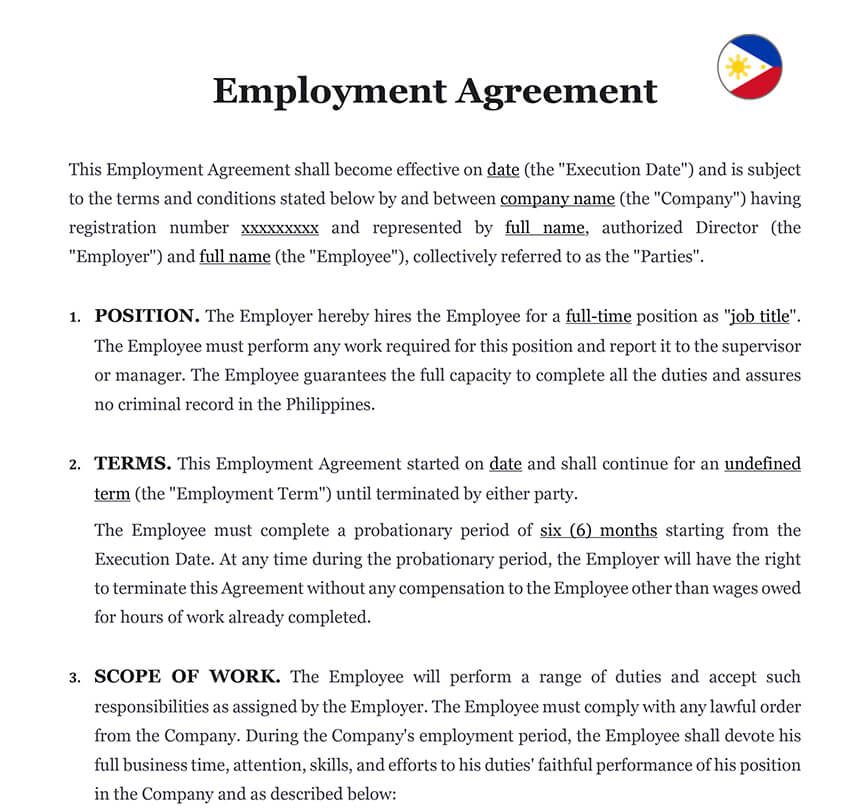What documents are required when hiring someone in the Philippines ?
When hiring someone in the Philippines, there are several documents that employers are required to prepare and submit. These include a Empolyment Offer Letter that outlines the terms and conditions of employment, an employment contract that serves as a legally binding agreement between the employer and employee, and registrations with various government agencies such as the Philippine Health Insurance Corporation (PhilHealth) and the Social Security System (SSS). Employers are also required to obtain a tax identification number (TIN) for their employees, as well as clearances from the local barangay office and the National Bureau of Investigation (NBI) to verify residency, good standing in the community, and criminal background. It is strongly recommended to use a Philippine Employment Contract when hiring an employee to ensure the protection of your interests and operations.
What is the hiring process in the Philippines?
Whether you’re a startup or looking to grow your business, hiring new employees is a crucial step in achieving your goals. If you’re considering hiring in the Philippines, it’s important to know the steps and requirements involved. Our comprehensive guide to hiring an employee in the Philippines covers everything you need to know, starting with job postings and ending with onboarding.
Step 1. Create a Job Description
To hire an employee in the Philippines, the initial stage involves crafting a job description that accurately outlines the position’s duties and requirements. This should include the job title, responsibilities, qualifications, and other details about the role. Be specific and clear about what you’re looking for in a candidate.
Step 2. Post the Job
Once you have a job description, you can post the job opening. There are various job boards and websites in the Philippines where you can post job ads, such as JobStreet, Kalibrr, and Indeed. You can also post on social media and your own website.
Step 3. Screen Resumes and Conduct Interviews
After you’ve received applications, you’ll need to screen resumes and conduct interviews to find the best candidate. It’s important to verify their credentials and experience, as well as their personality and fit for your company culture.
Step 4. Make an Offer and Negotiate Salary
Once you’ve found the right candidate, you can make a job offer and negotiate salary. The salary should be in line with industry standards and the candidate’s experience and qualifications.
Step 5. Sign Employment Contract and Register with Government Agencies
After the job offer has been accepted, you’ll need to sign an employment contract and register with government agencies such as the Social Security System (SSS), PhilHealth, and Pag-IBIG Fund. These agencies provide benefits such as healthcare and retirement savings for employees.
Step 6. Conduct Pre-Employment Medical Exam
Before the employee can start working, they’ll need to undergo a pre-employment medical exam. This is required by law to ensure the employee is fit for work and doesn’t pose a health risk to others.
Step 7. Onboarding and Training
Finally, you can onboard the new employee and provide any necessary training. This is important to ensure they understand their role and responsibilities, as well as your company culture and values.
Is it legal to hire foreign employees in the Philippines?
It is legal to hire foreign employees in the Philippines, subject to the requirements and procedures set by the Department of Labor and Employment (DOLE) and other government agencies.
The following are the general guidelines for hiring foreign employees in the Philippines:
1. Work permits and visas: Foreign employees must obtain a work permit and a visa before they can work in the Philippines. The employer must apply for the work permit on behalf of the foreign employee with the DOLE, and the employee must obtain the appropriate visa from the Philippine embassy or consulate in their home country.
2. Quota and non-quota positions: The DOLE imposes quotas on certain industries and professions that limit the number of foreign employees that can be hired. Non-quota positions, such as executives and managers, do not have any numerical limitations.
3. Skills and qualifications: The foreign employee must possess the necessary skills and qualifications required for the position. The employer must demonstrate that there is no local candidate available who is qualified for the job.
4. Minimum salary requirement: The employer must pay the foreign employee the prevailing wage rate for their position or a salary that is higher than the minimum wage for local employees.
5. Social Security and other benefits: The employer must comply with the mandatory social security contributions and other benefits required by the law, such as PhilHealth and Pag-IBIG contributions.
It’s important to note that hiring foreign employees in the Philippines may have legal and administrative complexities. It’s best to seek advice from the DOLE or a lawyer to ensure compliance with the law and regulations.

Can I terminate an employee during the probationary period in the Philippines?
An employer can terminate an employee during the probationary period in the Philippines. The probationary period is a trial period for both the employer and employee to assess if they are a good fit for each other.
Under the law, the maximum probationary period is six months, unless otherwise provided by the employment contract or collective bargaining agreement. During this period, the employer can terminate the employee for any valid reason, such as poor performance, misconduct, or violation of company policies and procedures.
However, the employer must still comply with the due process requirements, which include:
| ➤ Notice: The employer must give the employee a written notice of the termination and the reason for the termination. |
| ➤ Opportunity to be heard: The employee must be given the opportunity to explain or defend himself/herself against the charges, either in writing or in person. |
| ➤ Separation pay: If the termination is without cause, the employee is entitled to receive a separation pay equivalent to at least one-half month's pay for every month of service. |











